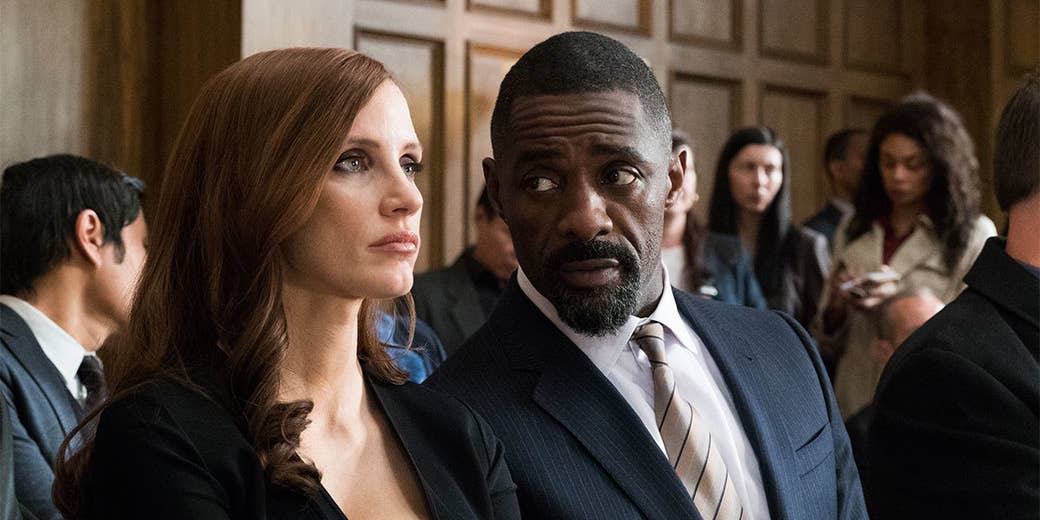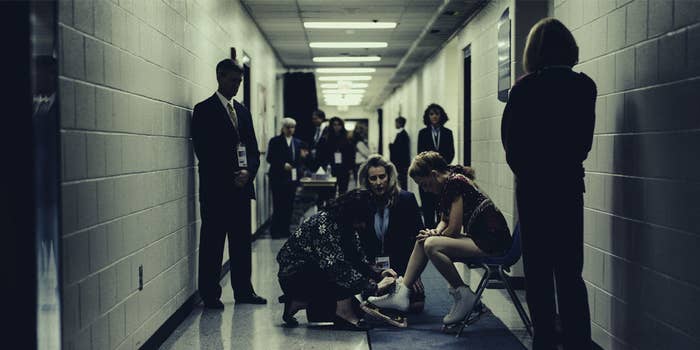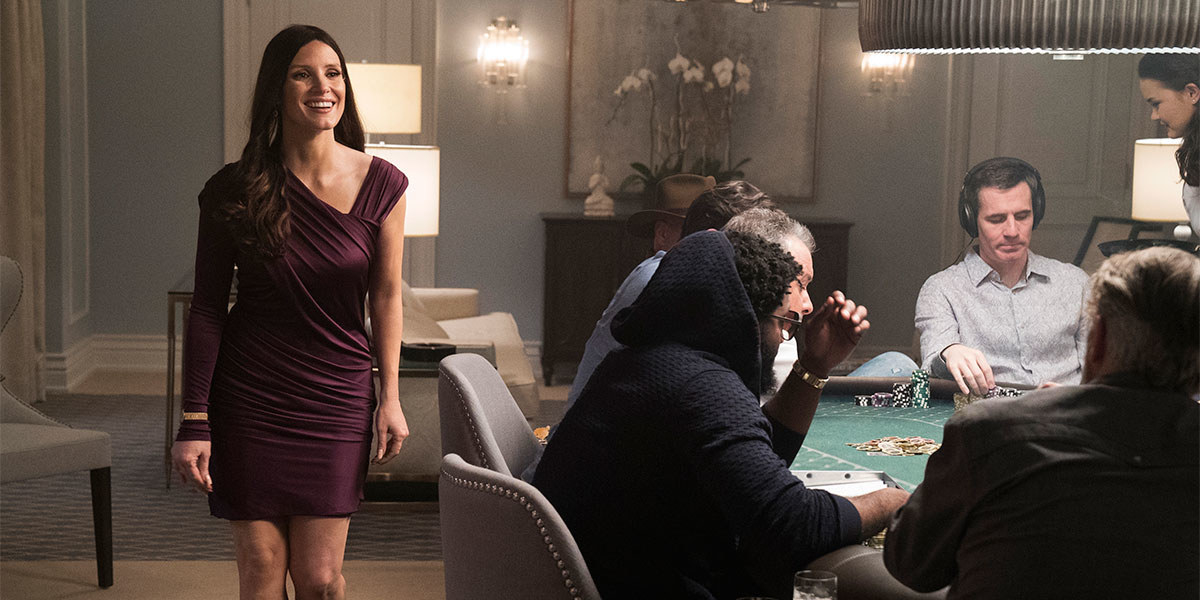
Neither Tonya Harding nor Molly Bloom ever won an Olympic medal, but both got close enough to taste gold. Harding made it onto the US Olympic figure skating team twice, though not onto the podium, the second time in a fog of controversy in the wake of the attack of rival Nancy Kerrigan. Bloom was in the qualifying trials for freestyle skiing when she wiped out, a life-derailing accident that would send her down a very different path of hosting illegal high-stakes poker games, getting raided by the FBI, and writing a book about the whole affair. Both Harding and Bloom are women whose public downfalls ended up eclipsing their successes — women with interesting, complicated stories. Which is why both are subjects of splashy movies that just premiered at the Toronto International Film Festival, with their respective stars, Margot Robbie and Jessica Chastain, getting reams of acclaim.
These are the kind of roles actorly dreams (and awards conversations) are made of — true stories! Juicy ones! As the Tonya of Craig Gillespie's I, Tonya, Robbie dons the fluffy bangs and the '90s fashions and then proceeds to tear her way, ravenous and incandescent, through a rise from poverty and fall from grace that's portrayed as both epic and ridiculous. As the Molly in Molly's Game, Chastain gets to rat-a-tat-tat her way through rapidfire Aaron Sorkin dialogue (the film is also marks his fairly slick looking directorial debut). Molly teaches herself about Texas hold 'em and the vices of rich men, and then saunters around her high-end gambling den like a unimpressed demigoddess in designer stilettos. Harding's and Bloom's lives make for unquestionably great parts, but how they fare in being translated to characters is a thornier question, one that could fuel the ongoing debate about what we want in a good female character.
The delightful I, Tonya, which Neon and 30West acquired at the festival, casts Harding's story as a tragicomedy, which has some journalists contending it does more laughing at her than with her. Its chosen tone is heightened and sardonic, and it leaps from the past to the present and back again, based (per its own description) on "wildly contradictory interviews" with Harding and her ex-husband, Jeff Gillooly (played by Sebastian Stan). Robbie, Stan, Allison Janney (deliciously despicable as Harding's embittered mom, LaVona), and Julianne Nicholson (as coach Diane Rawlinson) play their characters in the past, and in the present day, where they talk to the camera and give differing accounts of what happened. They also interrupt the action to complain about a lack of screen time or a niggling misunderstanding, or to defend themselves, or to break the fourth wall to disagree with what's on screen.

In other words, I, Tonya wears its subjectivity up front, something that fuels Gillespie's riskiest choice: to show Harding's life as one of moving from an abusive childhood with LaVona into an abusive marriage with Jeff into an abusive relationship with the American public. That is, at least, how Tonya presents it, as she runs up against figure skating's class ceiling early and repeatedly, too poor, too sturdy, and too "redneck" to please the sport's gatekeepers, but too good at skating and jumping to be ignored. She's an unreliable narrator, and while I wouldn't say I, Tonya laughs at her, it does undercut her attempts to self-mythologize her own status as an underdog turned unwitting villain. I, Tonya portrays an existence of legit hardship and depressingly normalized degradation, but one whose injustices were sometimes just bad choices, especially approaching "the incident." Its Tonya acquires a untidy grandeur because of her contradictions, not in spite of them, crushing out cigarettes with her skate blade and skipping over inconvenient details the film delves into anyway. She's no role model, but she's a hell of a pleasure to watch.
Personally, I would take a thousand stylized, self-rationalizing on-screen Tonyas over the Molly of the second half of Molly's Game, who gets increasingly, infuriatingly defined by the men in her life, among them her demanding dad (Kevin Costner). It's a consistently maddening Sorkin tendency that, in the first half of his first turn as a director as well as a writer, it looked like he'd kicked. Molly's Game, which will be released on Nov. 22 by STX Entertainment, is great as a poker procedural — Chastain in cool, cynical voiceover explaining the game at large and the games she ends up in charge of in particular. The savvy, capable Molly — who drifts into a celeb-heavy Los Angeles game she takes over, then travels to New York to start one of her own — is not a player herself. But she understands the ebb and flow of the game and what players want, perfectly, tailoring luxury environments and recruiting fresh meat to keep the regulars satisfied.
When Molly's Game digs into the business of gambling and the whims and vulnerabilities of powerful men who spend mountains of money trying to one-up each other, it is witty, gossipy, and very entertaining. That's especially true in the dynamic that develops between Molly and a capricious and cruel movie star played by Michael Cera called "Player X," a man on whom her LA game depends, but one who enjoys, as he puts it, "ruining lives." In Player X, Molly finds a fascinating antagonist who understands her manipulations and will tolerate them only as long as he feels outside of them. But the more Molly's Game tries to decide what its story is about rather than just telling it, the more the film feels like it's trying to "solve" Molly rather than portray her, to the point where its two big emotional moments involve Molly being sat down and informed about her own daddy issues by one male character, and getting passionately defended by another, her lawyer (Idris Elba), while she stays silent. Molly isn't much of a role model either, but Sorkin is increasingly intent on making her one anyway, even though what he finds more noble about her is her willingness to go to jail to protect the foibles and scandalous secrets of the wealthy men who were her clients.

It's the kind of development that can make a girl want to shake a fist at the sky and howl "Sorkiiiiiin!" But it's also an indication of how little we still all agree on what makes a great female character. Molly is smart, capable, bold, and complex, and yet in the end, Molly's Game feels a need to emphasize that she is also good, as if that were remotely relevant. It has men to attest to her strength, her upstanding aspects, and why her problems were not actually her fault, as if her worth as the subject of a film weren't evident without those details. In trying to affirm her value, Molly's Game relieves her of her agency and most intriguing qualities, something I, Tonya, far less forgiving, would never do. I, Tonya is harder on its main character, and better to her because of it, never reducing her to influences and circumstance or excusing her flaws. Molly's Game neatens up its protagonist in order to make her more appealing, missing the point entirely — which is that it's the messiness that makes characters rounded and interesting, regardless of their gender.
UPDATE
This post has been updated to include Neon and 30West's acquisition of I, Tonya.

